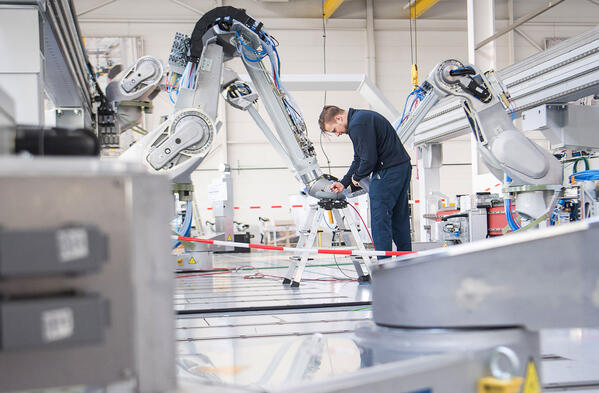Innovative economy: Germany reinvents itself

Germany is the largest economy in the European Union (EU) and the third largest in the world after the US and China. As such, it enjoys a strong network of partnerships around the world and regularly ranks in the top three nations for exports as well as imports. Germany’s gross domestic product totalled some 4.3 trillion euros in 2024. That year, it exported goods worth around 1,555 billion euros and imported goods worth over 1,316 billion euros.
Germany’s most important trade partners are:
- the countries of the EU (accounting for roughly two thirds of the total volume)
- China
- the USA
German industries that are particularly successful on the global market include:
Germany’s strengths: SMEs, start-ups, research
Germany also boasts a diverse and active start-up scene. The backbone of the German economy is the Mittelstand - small and medium-sized enterprises ( SMEs SMEs The German economy is characterized first and foremost by small and medium-sized enterprises as well as the self-employed and the independent professions. Some 99.4 percent of all companies are small and medium-sized enterprises. These are firms with annual sales of below EUR 50 million and a… Read more › ) - which includes many globally successful hidden champions from all regions of Germany.
The engine that drives economic development is the innovative strength of German companies. To secure and increase this, Germany invests more than three percent of its gross domestic product in research and development. More than two thirds of the over 121 billion euros spent in total per year are invested by businesses.
How is Germany making innovation part of its future strategy?
Germany is also providing targeted funding for new and disruptive technologies, innovations Innovations In 2021, company spending on research and development rose to 75.8 billion Euros. The automotive industry accounts for a large share of these investements. Read more › and business models. This included setting up the Federal Agency for Disruptive Innovation (SPRIND) in 2019 and the German Agency for Transfer and Innovation (DATI) in 2021. The Federal Government Federal Government The Federal Government and cabinet is made up of the Federal Chancellor and the Federal Ministers. While the Chancellor holds the power to issue directives, the ministers have departmental powers, meaning that they independently run their respective ministries in the framework of those directives… Read more › adopted a new AI Strategy in 2018 and created a similar Startup Strategy in the summer of 2022.
From social market economy to social-environmental market economy
Since 1949 German economic policy Economic policy In line with the federal system, structuring and coordinating economic and financial policy is the joint task of central government, the federal states and municipalities. They cooperate in various committees. Furthermore, the Federal Government seeks the advice of independent economists. Every… Read more › has been based on the model of a social market economy Social market economy The Basic Law of the Federal Republic of Germany does not call for any particular economic order. Yet it is firmly anchored in the principle of the welfare state and therefore excludes a purely free market economy. Since the founding of the Federal Republic of Germany in 1949 the country’s economic… Read more › . Developed in the post-war years by Ludwig Erhard (who would later become Federal Chancellor Federal chancellor The Federal Chancellor is the only member of the Federal Government to be elected. The constitution empowers him to personally choose his ministers, who head the most important political authorities. Moreover it is the Chancellor who determines the number of ministries and their responsibilities… Read more › ), this concept has kept Germany’s economy on an upward track. It guarantees that businesses can trade freely while simultaneously striving to create social checks and balances.
Why is the dual vocational training system a role model for the world?
The German economy is characterised by its strong “Mittelstand”, with small and medium-sized enterprises making up over 99 percent of all businesses in the country. They also provide more than half of all jobs and employ around 75 percent of trainees. In so doing, they safeguard the system of dual vocational training, which combines theoretical knowledge at vocational schools with practical training in companies. This dual model enjoys an outstanding reputation around the world and has been adopted by many other countries.
Frankfurt: home of finance and European monetary policy
Successful major international corporations also help shape Germany as a place to do business. Many are listed on the DAX stock exchange in Frankfurt, the key financial centre on the continent of Europe. Frankfurt is also home to the headquarters of the European Central Bank (ECB), whose duties include monitoring the price stability of the euro Euro The euro is the currency of the European Monetary Union and after the US dollar the second most important member of the international currency system. Together with the national central banks, the European Central Bank (ECB), headquartered in Frankfurt/Main, is responsible for monetary policy… Read more › .
A stable and attractive employment market
The German employment market has shown itself to be robust in the past, even during periods of crisis. Germany has one of the highest rates of employment in the European Union European Union In 1957, Germany was one of the six founding members of today’s EU, along with France, Italy, Belgium, the Netherlands and Luxembourg. The EU is currently made up of 27 states; the euro is the official currency in 20 of them. For Germany, European integration forms the basis for peace, security and… Read more › and one of the lowest unemployment rates. In 2024, for example, the unemployment rate in Germany averaged 6.0 percent. Youth unemployment is also very low.
How can the short-time working allowance safeguard jobs?
The short-time working allowance has proven to be a useful tool. It involves the state temporarily covering a major part of the salary shortfall if a company’s economic situation means that employees have to reduce their working hours for a certain period. This enables employees to keep their jobs despite a crisis and companies do not lose their experienced staff.
How is Germany addressing the skilled labour shortage?
Well-trained specialist professionals are essential to the competitiveness of the German economy. Germany is therefore taking steps on the one hand to enable people to undergo training, for example by further improving full-day childcare. On the other hand, laws such as the reformed Skilled Immigration Act aim to help recruit skilled professionals from abroad - which is vital against the backdrop of demographic shifts.
How is digital infrastructure advancing the industrial transformation?
Like almost every other country around the world, Germany is faced with the challenge of promoting digitalisation in the economy and also of how to shape the digital transformation in the world of work. To help make this happen, Germany is expanding its digital infrastructure in the form of broadband and 5G mobile technology. By developing technology for the Internet of Things (IoT), Germany is providing targeted support for Industry 4.0, where production processes are integrated with ways of communicating over the Internet.
What is being done to strengthen Germany as a location for start-ups?
Through its Startup Strategy, the Federal Government also aims to make Germany a leading location for start-ups in Europe. A range of measures and initiatives are helping clear away legal and regulatory barriers to setting up and financing startups, across areas such as innovation, digitalisation and sustainability.


